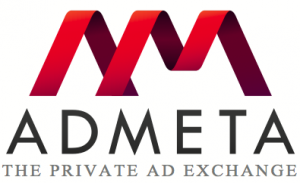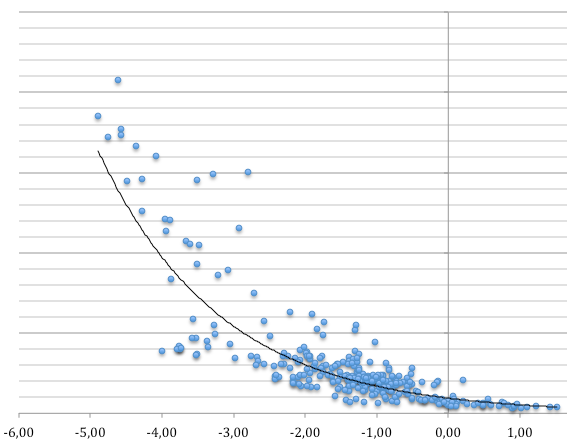'How the Number of Advertisers Will Impact Your eCPM in a Private Ad Exchange', by Leif Jägerbrand, co-founder & CRO, Admeta
by Romany Reagan on 31st Aug 2012 in News


Leif Jägerbrand is one of the founders of Admeta, a leading technology and knowledge provider of white labelled Private Ad Exchange solutions to premium publishers in Europe. He works as Chief Revenue Officer & Product Strategy.
Executive summary
In this post I will demonstrate how the number of advertisers very strongly correlates with the eCPM in Private Ad Exchanges. The data in this article is gathered from 10 of the largest media houses in Europe. In general, if you double the amount of advertisers, the eCPM will increase by 79%. I will also briefly discuss what implications this will have on sales strategy.
Background
In our every day work with the biggest publishers around Europe we spend quite some time pondering the million Euro question: how can we increase revenue? Since ad exchanges are auction-based, most people naturally understand that more advertisers mean more revenue, due to better optimisation and higher bids; but how much more revenue does twice as many advertisers translate into? We have dug into our data and found some pretty fascinating stuff that we would like to share with you.
(The data we are looking at is from 10 of the largest media houses in Europe during 2012.)
Number of advertisers versus eCPM
As you increase the number of advertisers in a Private Ad Exchange, the number of impressions per advertiser will drop, and that will lead to increased eCPM for mainly three different reasons:
- Better optimisation, since there are more advertisers from which to choose.
- Lower frequencies on average per advertiser.
- Higher competition leads to higher bids.
However, to answer the main question of this post, we don’t need to separate those different factors from each other at this moment, but it can be good to know why the eCPM goes up.
So what happens as the number of advertisers increase? First let’s look at the correlation between number of advertisers and eCPM. The X-axis in the chart represents the number of impressions the average advertiser gets in a week. So the further to the right in the chart we move, the less competition there is. The Y-axis represents the eCPM that the media house had that week. So each dot in the chart represents one week for one media house.
If you are even slightly familiar with statistics, then you probably just thought, “wow, there’s a pretty strong connection!” -- and that’s right. When looking at this kind of data, it is quite rare that it gets clearer than this. The R² value is a whopping 0.77. An R² value of -1 or 1 means that there is a perfect connection between the two variables, 0 means that there is no connection at all. 0.77 means that 77% of the eCPM values can be explained by the number of impressions per advertiser per week.
However the key question in this whole post is to find out: how much will the eCPM increase if we double the amount of advertisers? That is not so easy to spot by just looking at the chart above, so we need to tweak the data a bit more.
Now it’s going to get slightly mathematical, but please bear with me. It is for the sake of clarity.
In the chart below I have used the same data as above but transformed the X-axis using logarithmic scale with 2 as base. In a non-mathematical language that translates to moving one step (like from -3 to -4) left on the scale means doubling the amount of advertisers competing per impression.
Now it is much easier to follow what happens. If you look at the value at -3 versus the value at -4 on the X-axis, you see that the value at -4 is almost twice as much, meaning that twice as many advertisers should double the revenue.
The beauty of Excel though is you can eliminate the guesswork and do exact calculations. This is how those calculations turn out after a bit of number crunching:
- Adding 50% more advertisers will increase the eCPM 41%
- Double the amount of advertisers and the eCPM will increase 79%
- Triple the amount of advertisers and the eCPM will increase with 152%
- Quadruple the amount of advertisers and the eCPM will increase with 221%
Implications on sales strategy
As we see in the data, the eCPM will be about 80% higher if you get 10 advertisers with a €1,000 budget each, instead of five advertisers with a €2,000 budget each -- even though the total budget of all the advertisers is the same.
So my advice is this: it is MUCH more critical to get many advertisers than big budgets!
Perhaps the targets for your sales team should not be on total budgets, but on the number of advertisers instead? Maybe the focus of your next sales strategy meeting should be, “how can we double the amount of advertisers”? Adding many advertisers is absolute key in order to get the maximum out of a Private Ad Exchange. I would look forward to hear your ideas and comments regarding this.
DisplayExchangeProgrammaticPublisher










Follow ExchangeWire